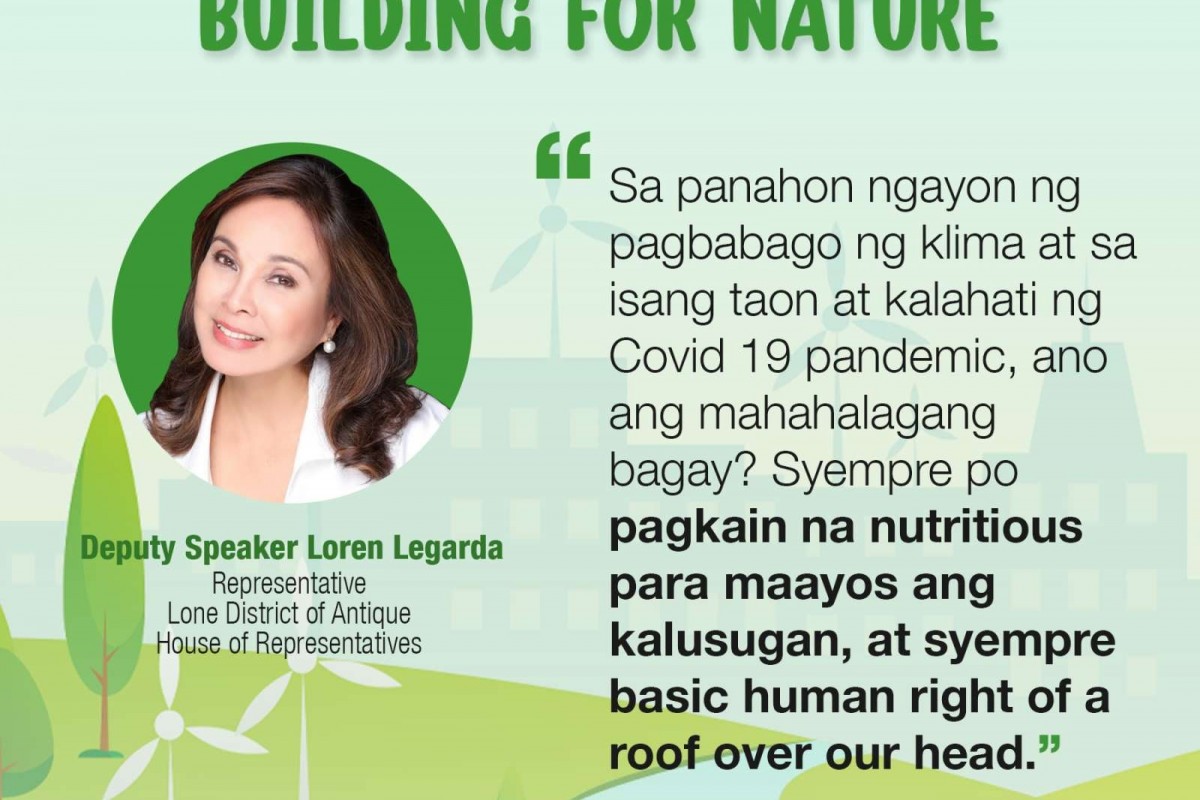QUEZON CITY, (PIA) -- The 55th episode of “Stories for a Better Normal: Pandemic and Climate Pathways” featured housing and architectural structures that demonstrate the concepts of regenerative architecture and Earthen shelters that are disaster- and climate-resilient.
The online conversation conceptualized and hosted by three-term Senator, now Deputy Speaker and Antique Representative Loren Legarda with co-host Atty. Ipat Luna featured nature advocates and innovators Architect Ronnie Yumang, ASEAN architect and environmental planner; and Beau Baconguis, Earth builder and permaculturist. Department of Trade and Industry – Design Center of the Philippines Executive Director Rhea Matute also joined.
“Anong klaseng bahay ba ang bagay sa Pilipinas? (What type of shelter is appropriate for the Philippines?) Dapat iakma natin ang ating pamamahay. (We should adapt our homes.) Dito pumapasok ang disaster risk reduction. (This is where disaster risk reduction comes in.) Mayroon tayong mga risks na hindi natin maiiwasan dahil na rin sa kalikasan. (We have unavoidable risks due to nature.) Maaring bawasan natin ang ating risk o ang pagkakataon na tayo’y masalanta. (We can reduce our risk or our vulnerability to disasters.) ‘Yun ang DRR. Component nyan, vulnerability. (That is DRR. It is one of the components--vulnerability.) Dahil ang Pilipinas ay madalas tamaan ng bagyo, palakas nang palakas, patindi nang patindi dahil sa pagbabago ng klima, ay vulnerable tayo o madaling matamaan, pati na rin ng drought o ‘yung matinding tagtuyot. (We are vulnerable to stronger and stronger cyclones due to climate change, including drought.) Apektado diyan ang pagkain, agrikultura, at fisheries. (Our food, agriculture, and fisheries are affected.) Proteksyon natin sa lahat ng elementong 'yan ang ating tahanan. (Our home is our protection against all the elements.),” Legarda emphasized.
Architect Yumang, developer of Maka Forest Villas and Residences, introduced regenerative architecture systems thinking, a system that connects humans with the environment and goes beyond just conventional saving and sustainability.
“Even if we conquer the world with sustainable certified buildings, will it actually improve the condition of our Earth’s health? This will not be the only solution, we should go towards a regenerative solution. We should start replenishing our lost Earth’s plenitude. Ibig sabihin nito, kinakailangan ay punan natin ‘yung mga nawala instead na nagse-save lamang tayo, na ibalik kung ano ‘yung mga dating abundance na meron ang Earth,” said Architect Yumang.
“The world consumes 10 billion tons of cement and 50 billion tons of sand every year. It is alarming to know that these resources are finite and not renewable in the next 200 million years, and we are actually running out of sand. Hindi ito pang-habang panahon, hindi ito unlimited. Kinakailangan po ngayon na tipirin natin ito. Otherwise, if we continue to overconsume, mauubos ito at darating ‘yung panahon na magmamahal yung presyo nito,” he added.
Baconguis showed domes, vaults, and cylinder houses that can withstand climate hazards and serve as emergency shelters. She introduced SuperAdobe or Earthbag method, a building method that utilizes the basic elements of earth, water, air, and fire – soil, rice sacks and basic materials in structures.
“We need to understand first the building principles involved so we don’t compromise the structural integrity especially if you’re going to live in it. We need to increase the advocacy for Earth Architecture. There are different types of Earth Architecture methods being used here in the Philippines and we need to have networks so that we can all have a conversation together,” said Baconguis.
As an online discussion to promote health, environmental consciousness, and climate-adaptive practices, "Stories for a Better Normal" aims to change the mindset of individuals, families, and communities by demonstrating ways in which a ‘better normal’ can be realized within our communities.
This online discussion is organized in partnership between the Office of Deputy Speaker Legarda and the Climate Change Commission, with support from the Department of Education, Philippine Information Agency, Institute for Climate and Sustainable Cities, The Climate Reality Project-Philippines and Mother Earth Foundation. (PIA-NCR)




